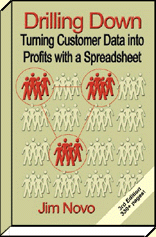
into Profits with a Spreadsheet
The Guide to Maximizing Customer Marketing ROI
Customer LifeCyclesJim's Intro: A more complex version of the RFM model: customer behavior over time. Ah, time. Time is the most overlooked and underutilized tool in the Data-Driven marketing toolbox but one of the most powerful. You can see the strength of timeís influence in the importance of Recency, the most powerful of the modeling variables. Customer behavior changes over time and these changes are clues to the future. These changes over time are known as the customer LifeCycle; and the LifeCycle is used to calculate LifeTime Value. Without knowing the LifeCycle, it's impossible to find LifeTime Value. Customer profiles tend to be a "snapshot" of the customer, their characteristics or behavior at a single place in time. But are you the same person now as you were last year? Have you not had experiences and thoughts and triumphs and downfalls in the past year that changed the way you think and behave? Even though activity-oriented human behavior can be modeled at a point in time, it is far more powerful to look at it over a time period. This issue is lost on many who do "profiling" in todayís environment, and even some of the pros from the catalog and TV shopping worlds where these techniques were developed donít grasp the power of profiling customers over time. I think youíd agree knowing not only the current state of the customer, but also the path to this state, can provide critical additional clues to a customerís potential and future behavior. Knowing the path provides powerful input into the marketing approach to be used to address the current state of the customer. How is this accomplished? You need to store customer scores like Recent Repeaters or RFM scores for the same variable (purchases, visits, etc.) in your customer database, and extract trends from these scores over time. Itís like a blend of Hurdle Rate analysis and customer scoring techniques. Instead of having one Hurdle Rate to watch over time, you look at the multiple customer scores themselves over time. For an example of applying this technique to choosing the most profitable ads to run, see the tutorial: Comparing the Potential Value of Customer Groups. Itís tremendously powerful stuff. Imagine this. Each month (or week) you do a profile of your customers. But instead of replacing the old score, you keep it, and add the new one. Then look at the spreadsheet or query the database and ask, "Find everybody who has a lower score this month than last month, and find everybody who has a higher score this month than last month." Think of what you could do with that information. Anybody who had a high loyalty score and doesn't anymore deserves your promotional attention, before they drop even lower, with visits or purchases. Anyone with a rising score should be encouraged with promotions. Generally, anyone who is moving lower in score is in the process of defecting ó of leaving you as a customer. The more dramatic the move, the more likely they are to be defecting. The mirror image is true for those climbing in score. The more dramatic the move, the more likely it is they are on their way to becoming a more valuable customer and adding value to your business. Here is the dirty little secret of interactive behavior: The customer lifecycle for interactive businesses is more exaggerated than for traditional businesses. The behavior ramps up faster at the beginning of the LifeCycle, but then falls off faster into the end of the LifeCycle. The speed or rate of behavior change is incredibly important to modeling interactive behavior, much more important than in offline models. Small changes over time are to be expected; rapid and accelerating changes are much more significant and a signal for action. So once you use scores to identify customer behavior, think about re-profiling your customers at certain intervals and keep track of scores over time. You'll be glad you did. Step by step instructions for creating likelihood to respond and future value scores for each customer, and using scores to create high ROI promotions based on the customer LifeCycle are found in the Drilling Down book. |
|
|
|
Slow connection? Same content, less graphics, think Jakob Nielsen in Arial - Go to faster loading website Contact me
(Jim Novo) for questions or problems with anything on this web site.
| |
![]()
|
Get the book with Free scoring software at Booklocker.com Find Out Specifically What is in the Book Learn Customer Marketing Concepts and Metrics (site article list)
|
|
|
